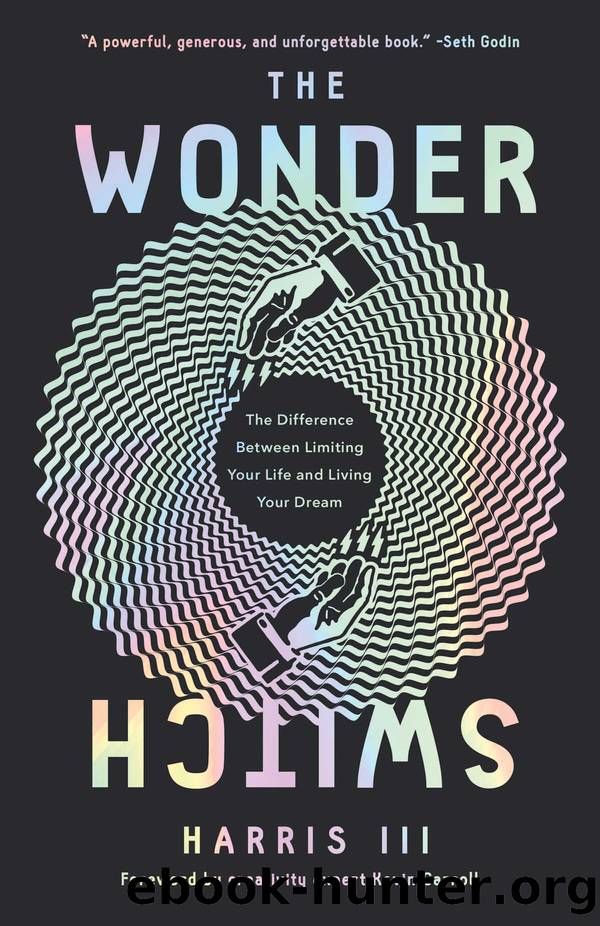The Wonder Switch: The Difference Between Limiting Your Life and Living Your Dream by Harris III

Author:Harris III
Language: eng
Format: epub
Publisher: HarperCollinsChristianPublishing
Published: 2020-08-22T00:00:00+00:00
Two Words That Change Everything
Two of the most powerful words of the English language are âWhat if?â
âWhat ifâ is the foundation for countless stories. What if a giant killer shark terrorized a small town? I have a feeling Peter Benchley asked that question when he wrote Jaws. What if an alien race came to visit earth? Practically every sci-fi story is based on that question. What if a brave young woman volunteered to fight in an event with life-or-death stakes? Suzanne Collins answers this question in The Hunger Games. What if a crazed fan trapped a famous writer? Stephen King addressed this question in his book Misery. What if toys had feelings? What if fish had feelings? What if robots had feelings? What if feelings had feelings? âWhat ifâ is the birthplace of almost every Pixar film.
When you ask âwhat if?â you start to think and dream. These two words are vision-casting wordsâthey invite you to look with wonder toward the future. You might even find yourself creating something new. âWhat if?â engages your brain to consider the many possibilities and to pursue wonder. âWhat if?â cracks open the door of possibility and invites passion and purpose in.
However, we often misplace our âwhat if?â mindset. Instead of applying this question to the present or the future, we apply it to the past. And this question eats at us from the inside. Asking âwhat if?â about the past gradually transforms to âif only.â
If only I were more attractive, I would not be alone.
If only I were smarter, I would have more money.
If only I had worked harder, I would not have gotten fired.
âIf onlyâ will guide you to shame. Over time, as these shaming thoughts plague your mind, you will accept these lies as truth. A great way to avoid this pitfall is to turn your âwhat ifsâ around and put them back where they belong: on your future, not your past. Unless the goal is to engage in a form of healing from previous trauma as in the research outlined earlier, practice using your imagination to look forward, not back.
The dark sides of our imaginations are powerful and can crush our wonder if we let them. If we give in to backward-looking âwhat ifs,â we end up living in the past, constantly replaying the stories weâve lived, thinking of all the ways we could have said or done things differently.
âWhat if I wouldnât have made that mistake?â
âWhat if I wouldnât have said those words?â
But whatâs done is done. While you canât control the past, it can inform the present and be used to predict the future. If weâre stuck, it can often be useful to go backward in order to move forward. But you have the opportunity to reimagine your future. When we reawaken our wonder, weâre permitted to shift to forward-looking âwhat ifsâ instead.
âWhat if I tried something new?â
âWhat if I wrote that book Iâve always wanted to write?â
âWhat if I started a business?â
âWhat if I asked her out?â
âWhat
Download
This site does not store any files on its server. We only index and link to content provided by other sites. Please contact the content providers to delete copyright contents if any and email us, we'll remove relevant links or contents immediately.
Professional Troublemaker by Luvvie Ajayi Jones(29649)
Whiskey Words & a Shovel I by r.h. Sin(19389)
Rewire Your Anxious Brain by Catherine M. Pittman(18642)
Healthy Aging For Dummies by Brent Agin & Sharon Perkins RN(17036)
Cat's cradle by Kurt Vonnegut(15333)
Talking to Strangers by Malcolm Gladwell(13346)
The Art of Thinking Clearly by Rolf Dobelli(10451)
They Both Die at the End by Adam Silvera(9807)
The 5 Love Languages: The Secret to Love That Lasts by Gary Chapman(9784)
Doing It: Let's Talk About Sex... by Hannah Witton(9275)
The Compound Effect by Darren Hardy(8942)
Thirteen Reasons Why by Jay Asher(8893)
Goodbye, Things by Fumio Sasaki(8575)
Wonder by R.J. Palacio(8569)
Tools of Titans by Timothy Ferriss(8363)
Atomic Habits: Tiny Changes, Remarkable Results by James Clear(8323)
Becoming Supernatural by Dr. Joe Dispenza(8199)
Wonder by R. J. Palacio(8097)
Change Your Questions, Change Your Life by Marilee Adams(7758)
